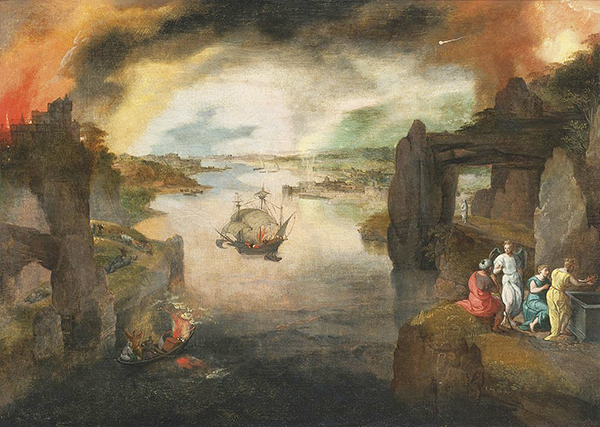On Christian Accompaniment
- ROBERT W. SHAFFERN
During July, which will probably forever now bear the name of the first of the Deadly Sins (Pride), numerous figures both inside and outside the Church encouraged us to accompany, walk with, and stand by folks who identify somewhere along the LGBTQ+ spectrum.
 Sodom and Gomorrah by Gillis Mostaert, Public domain, via Wikimedia Commons.
Sodom and Gomorrah by Gillis Mostaert, Public domain, via Wikimedia Commons.
They tell us that Jesus welcomed sinners and that Catholics ought to as well, in imitation of the one whose Sacred Heart gets diminished, even mocked amid the parades, corporate endorsements, and professional sports theme nights.
Fr. James Martin, S.J., exhorts his readers and listeners to accept people "as they are." Catholics are told to get behind these initiatives, and the Catechism of the Catholic Church is invoked in support, for it instructs the faithful to treat same-sex attracted people with compassion and as brothers and sisters.
But a sermon that St. Augustine preached on the vigil of Easter Sunday might also be brought to bear on all these developments. He drew attention particularly to division and disillusion within the Church herself even in his day. The antics of unrepentant sinners, says Augustine, discourage faithful Christians. Among other things, the unrepentant make others feel isolated, and thereby vulnerable, since all human beings crave association with their fellows.
Augustine also wrote eloquently of loneliness and the degradation of friendship, community, and society in the Confessions. In Book Four of that masterwork, he described the often-misunderstood tale of the pear tree. Augustine and his adolescent pals stole pears from the tree not because they were hungry nor to enjoy the pears, which he says were a bit dodgy. They stole them simply because they delighted in the wickedness, a wickedness which, he says, he would not have participated in except for wanting to be a part of that small crowd.
Most people have had similar experiences—going along with the crowd even though the crowd is wrong, and they know it.
A similar dynamic explains recidivism among released convicts. When freed from prison, they too often return to associating with their former partners in crime, who once again become their current partners in crime. They get sent back to prison because they returned to their criminal behavior in no small part out of peer pressure.
So in his sermon for the Easter Vigil, Augustine told his listeners to avoid the company of sinners. Our desire for approval and acceptance feeds a powerful temptation to imitate their sinful ways. As he put it, "on this threshing floor, in truth, grain can degenerate into chaff." As the episode of the pear tree and the American problem with recidivist crime make clear, the young are particularly vulnerable to the corruption of those with whom they spend time.
Too many of the champions of contemporary accompaniment have forgotten that true charity is linked to the truth and to uprightness.
Calls for accompaniment of sinners are everywhere now, not least within the Church herself. But Christian accompaniment must mean more than just spending time together. God warned Ezekiel—who in turn warned the Israelites—"[If] you do not speak out to dissuade the wicked from his way, he shall die for his guilt, but I will hold you responsible for his death. But if you warn the wicked man ... and he refuses to turn from his way, he shall die for his guilt, but you shall save yourself."
Too many of the champions of contemporary accompaniment have forgotten that true charity is linked to the truth and to uprightness.
St. Luke tells the story of the sinful woman who bathed the feet of Jesus with her tears, wiped them dry with her hair, and then anointed them with aromatic ointment. Seeing all that, a Pharisee said that Jesus would not accept her service if he knew from whom it was coming. Jesus, knowing the repentant heart of this woman, compared her favorably with the Pharisee's self-righteousness.
When the rich young man asked Jesus what he needed to do to become one of his followers, Jesus told him to sell all his possessions and give the proceeds to the poor. The young man turned away; he had not nor could not have the change of heart that the Gospel required.
Peter once confessed to Christ, "Depart from me, O Lord, for I am a sinful man." In the sermon already cited, Augustine told the people of Hippo, "God does not wish the death of the sinner, but only that he be converted from his ways and live."
The soul must find the wherewithal to "Seek the good; cleave to the good; be good." Jesus himself told his disciples that they were to shake the dust off their feet and leave places that would not hear the Gospel.
Christian accompaniment begins not with celebrating how wonderful we are. "Pride" about ourselves is the language of politicians and other flatterers seeking to curry favor with people they hardly know. The whole point of Christianity is the renewal and repentance of sinners—which is to say all of us—and our preparation for eternal life.
The Psalmist indeed says we are wonderfully made, but that wonder, that divine spark (as it was once called) can only really be known when whatever brokenness, whatever sin, has been fully confronted and amended. Otherwise, encounters with Christ amount to little more than a thin sentimentality.
As the Eucharistic Confession prior to communion in the Byzantine rite says, quoting St. Paul in 1 Timothy, Christ came to save sinners, "of whom I am the first." Sin means that the wonder of our created selves is difficult to apprehend. But strip away sin, including the sin of Pride, and a beautiful creature comes into sight.
 This is J. Fraser Field, Founder of CERC. I hope you appreciated this piece. We curate these articles especially for believers like you.
This is J. Fraser Field, Founder of CERC. I hope you appreciated this piece. We curate these articles especially for believers like you.
Please show your appreciation by making a $3 donation. CERC is entirely reader supported.

Acknowledgement
 Robert W. Shaffern. "On Christian Accompaniment." The Catholic Thing (July 9, 2023).
Robert W. Shaffern. "On Christian Accompaniment." The Catholic Thing (July 9, 2023).
Reprinted with permission from The Catholic Thing.
The Author
Robert W. Shaffern is a professor of medieval history at the University of Scranton. Dr. Shaffern also teaches courses in ancient and Byzantine civilization, as well as the Italian Renaissance and the Reformation. He is the author of The Penitents' Treasury: Indulgences in Latin Christendom, 1175-1375.
Copyright © 2023 The Catholic Thing

